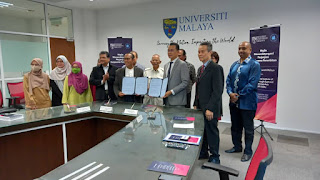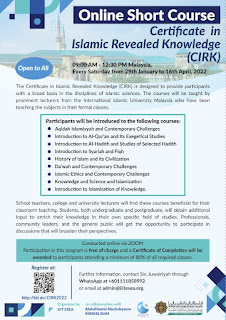The mastery of modern disciplines is considered as a necessary step towards Islamisation of Knowledge. In the first edition of “Islamization of Knowledge: General Principles and Workplan”, Ismail al Faruqi (1982) lists five important objectives of Islamisation of Knowledge. These include (1) To master the modern disciplines, (2) To master the Islamic legacy, (3) To establish the specific relevance of Islam to each area of modern knowledge (4) To seek ways for creative synthesis between the legacy and modern knowledge and (5) To launch Islamic thought on the trajectory which leads it to fulfillment of the divine patterns of Allah (SWT).
According to Al Faruqi, the process towards achieving would entail a serious endeavour on the part of Muslim scholars to research and write on the genesis and historical development of each discipline, highlighting the contributions made by their great votaries. Al Faruqi suggests that these surveys should be accompanied by annotated bibliographies of the most important works to constitute a base of common understanding “on the identity, history, topography and frontiers” of the disciplines for specialists to Islamize (p.39). AbdulHamid AbuSulayman (1988) expanded the Workplan with a comprehensive explanation on each step. AbuSulayman emphasized on the importance of mastery of both Islamic thought and modern Western sciences as Muslim scholars pass through the stage of contemplation towards developing methodologies for further development of Islamized knowledge. This methodology will be essential for development of knowledge as well as ensure successes in material and spiritual development. AbuSulayman noted that for this process to succeed, the institute should “work on preparing a comprehensive survey of modern sciences, especially the basic social sciences and humanities” to provide “a brief account of each science and outline its main issues methodology and achievements”. This, he noted, would provide a basic reference work for Muslim scholars working on Islamisation to have a critical insight on the modern disciplines. (p. 69).
Based on the aspiration of IIIT founders, the International Institute of Islamic Thought East and Southeast Asia office in collaboration with Research Management Centre IIUM, is embarking on an important pioneering project towards building a database for important references (manuscripts, journal articles, book chapters, etc.) that present an Islamic perspective on selected academic disciplines and/or subdisciplines. The aim of this project is twofold. First, to systematically search and identify as many good reading materials as possible in each specific discipline and categorise them based on the subdisciplines that they may be relevant. This list of materials will serve as a starting point for young and new researchers who wish to conduct research on Islamic perspectives in their respective specialisations. Secondly, to prepare and organize a substantial and exhaustive collection of useful reading materials on Islamic topics which will help to assess our current state of research and scholarship in Islamic related disciplines and to identify areas where more attention needs to be focused for future research activities. Third, this project will provide our experts in different fields to contribute their knowledge and expertise to review some of the important discipline-based Islamic works. These reviews and discussion papers would serve as guides to young scholars, researchers and students. The review/discussion papers (and where appropriate the papers selected for the reviews) will be compiled and published and made available to students, researchers and the public to promote and facilitate further research in Islamic related subjects and disciplines. For further information, please kindly write to iiit.eastasia@gmail.com.











































